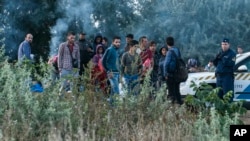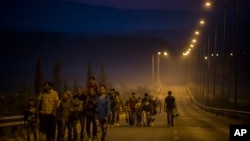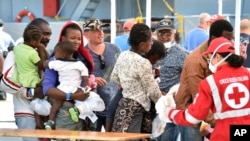Record numbers of migrants are entering Hungary, officials said Tuesday, as well as arriving in many other parts of Europe. The U.N. refugee agency is calling on all governments to respond compassionately to this human tide of people who have been displaced from their homelands and are now seeking safety.
Hungary has registered more than 100,000 migrants in 2015, more than double the number from last year. Authorities said nearly 2,100 crossed the border Monday, the highest number to do so in a single day.
Hungary, a member of the European Union, is rushing to complete a border fence to control the flood of migrants who have made their way across Serbia to reach the border of an EU state, where they hope to find assistance, shelter and work.
Thousands of migrants, mostly from Syria, Iraq and Afghanistan, are following that path after crossing the Mediterranean to land in Greece. Police in Macedonia initially prevented them from passing through that country, but after clashes on Friday and Saturday the migrants swept past overwhelmed police and reached Serbia.
Funding shortfall
The UNHCR said Tuesday it expects 3,000 more people a day will be crossing from Greece into Macedonia, at least for the next few days. The agency stressed the need for humane treatment, and said the situation in Europe will not change as long as conditions in Syria and Iraq do not change.
The United Nations has said it needs $7.5 billion in contributions this year to help Syrian refugees, but pledges by member states so far have covered only 30 percent of that total.
UNHCR spokeswoman Melissa Fleming said the refugees and migrants — among them many vulnerable women, children and elderly — are in very poor condition when they arrive in Europe.
“They are often physically exhausted. They are psychologically traumatized and very often in need of humanitarian medical assistance," said Fleming. "So it is vital that these people are treated humanely. Also, that essential assistance is provided.”
Europe's response a failure
Meanwhile, Francois Crepeau, the U.N.'s special rapporteur on the human rights of migrants, said Tuesday that Europe is failing in its response and needs a new migration policy that emphasizes mobility.
"Let's not pretend that what the EU and its member states are doing is working," Crepeau said in a statement. "Building fences, using tear gas and other forms of violence against migrants and asylum seekers, detention, withholding access to basics such as shelter, food or water and using threatening language or hateful speech will not stop migrants from coming or trying to come to Europe."
Crepeau said Europe needs to pursue a resettlement program for refugees like those who have fled Syria and Eritrea, saying that kind of program would not only help countries prepare for people they choose to let in but also discourage smugglers and profiteers who currently moving migrants to Europe by dangerous methods.
Joost Hiltermann, program director for the Middle East and North Africa of the International Crisis Group in Brussels, said the European Union is divided in its approach to dealing with migrants, "with some countries taking certain steps, and others trying other steps. So there is no coordination, and therefore, no effective response to the crisis.”
The International Organization for Migration says more than 250,000 migrants have crossed by sea to Europe this year, with most of them landing in Italy or Greece. Nearly 2,400 people have died making the journey.
Lisa Schlein and Jeffrey Young contributed to this report.







